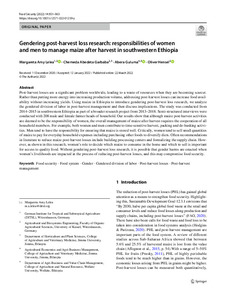| dc.date.accessioned | 2022-08-11T12:14:46Z | |
| dc.date.available | 2022-08-11T12:14:46Z | |
| dc.date.issued | 2022-03-22 | |
| dc.identifier | doi:10.17170/kobra-202207286539 | |
| dc.identifier.uri | http://hdl.handle.net/123456789/14044 | |
| dc.description.sponsorship | Gefördert im Rahmen des Projekts DEAL | ger |
| dc.description.sponsorship | Through an initiative for research on the Global Food Supply (GlobE) by the German Federal Ministry of Education and Research (BMBF) in cooperation with the German Federal Ministry for Economic Cooperation and Development (BMZ) for the project: Reduction of Post-Harvest Losses and Value Addition in East African Food Value Chains (RELOAD) (Grant Number 031A247D) | eng |
| dc.language.iso | eng | |
| dc.rights | Namensnennung 4.0 International | * |
| dc.rights.uri | http://creativecommons.org/licenses/by/4.0/ | * |
| dc.subject | food security | eng |
| dc.subject | food system | eng |
| dc.subject | gender | eng |
| dc.subject | gendered division of labor | eng |
| dc.subject | post-harvest losses | eng |
| dc.subject | post-harvest management | eng |
| dc.subject.ddc | 630 | |
| dc.title | Gendering post-harvest loss research: responsibilities of women and men to manage maize after harvest in southwestern Ethiopia | eng |
| dc.type | Aufsatz | |
| dcterms.abstract | Post-harvest losses are a significant problem worldwide, leading to a waste of resources when they are becoming scarcer. Rather than putting more energy into increasing production volume, addressing post-harvest losses can increase food availability without increasing yields. Using maize in Ethiopia to introduce gendering post-harvest loss research, we analyze the gendered division of labor in post-harvest management and then discuss implications. The study was conducted from 2014–2015 in southwestern Ethiopia as part of a broader research project from 2013–2018. Semi-structured interviews were conducted with 208 male and female farmer heads of household. Our results show that although maize post-harvest activities are deemed to be the responsibility of women, the overall management of maize after harvest requires the cooperation of all household members. For example, both women and men contribute to time-sensitive harvest, packing and de-husking activities. Men tend to have the responsibility for ensuring that maize is stored well. Critically, women tend to sell small quantities of maize to pay for everyday household expenses including purchasing other foods to diversify diets. Often recommendations in literature to reduce maize post-harvest losses include building processing centers and formalizing the supply chain. However, as shown in this research, women’s role to decide which maize to consume in the home and which to sell is important for access to quality food. Without gendering post-harvest loss research, it is possible that gender harms are enacted when women’s livelihoods are impacted in the process of reducing post-harvest losses, and this may compromise food security. | eng |
| dcterms.accessRights | open access | |
| dcterms.creator | Lelea, Margareta Amy | |
| dcterms.creator | Garbaba, Chemeda Abedeta | |
| dcterms.creator | Guluma, Abera | |
| dcterms.creator | Hensel, Oliver | |
| dc.relation.doi | doi:10.1007/s12571-022-01259-y | |
| dc.relation.projectid | Grant Number 031A247D | |
| dc.subject.swd | Äthiopien | ger |
| dc.subject.swd | Ernte | ger |
| dc.subject.swd | Ertragssteigerung | ger |
| dc.subject.swd | Arbeitsteilung | ger |
| dc.subject.swd | Geschlechterforschung | ger |
| dc.subject.swd | Ernährungssicherung | ger |
| dc.subject.swd | Ernteverlust | ger |
| dc.type.version | publishedVersion | |
| dcterms.source.identifier | eissn:1876-4525 | |
| dcterms.source.issue | Issue 4 | |
| dcterms.source.journal | Food Security | eng |
| dcterms.source.pageinfo | 951-963 | |
| dcterms.source.volume | Volume 14 | |
| kup.iskup | false | |


